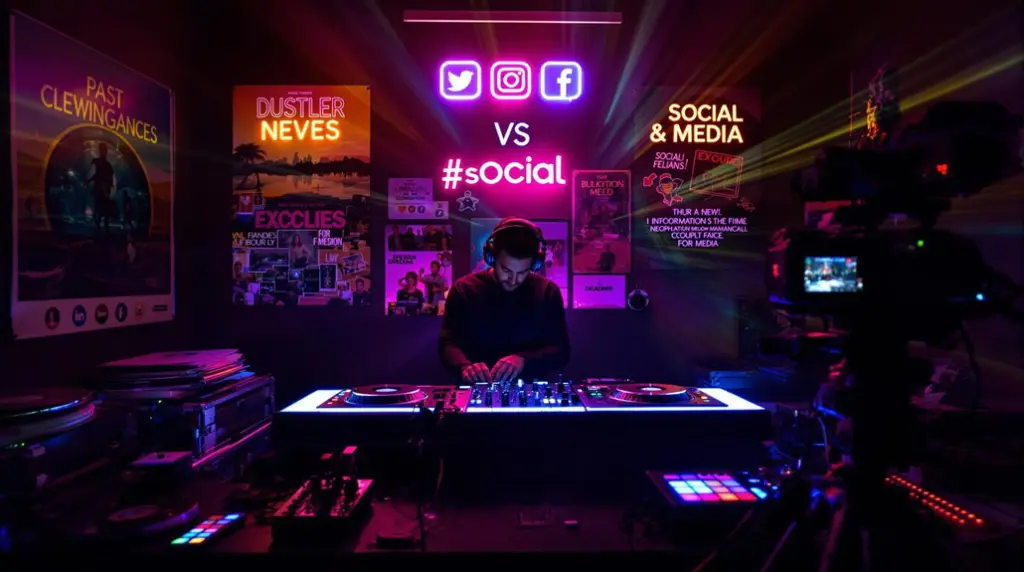As a DJ, you’ll need a well-rounded music library equipped with a variety of genres, from the soulful beats of House to the rapid rhythms of Drum & Bass. Incorporate both timeless classics and current hits to bridge generational tastes effectively. Don’t just stick to familiar tracks; explore genre crossovers and regional music to spice up your sets. Additionally, organizing your library by mood and energy levels can greatly ease your workflow, ensuring you’re prepared to match the vibe of any event. By continuously updating and expanding your collection, you’ll stay ahead in the dynamic world of music. Ready to enhance your DJ skills further?
Key Takeaways
- A diverse selection of genres, from house and techno to drum & bass, to cater to different crowds and venues.
- Classic tracks that are timeless across various musical eras to engage a wide audience demographic.
- Current hits and trending remixes to keep the set fresh and relevant.
- Mood-based playlists to effectively manage the energy and atmosphere of any event.
- High-quality versions of each track to ensure the best sound experience during performances.
Essential Music Genres for DJs
To excel as a DJ, you must master essential music genres such as House, Techno, Hip-Hop, Drum & Bass, and Tech House. Each genre not only stands distinct but also offers rich avenues for genre crossovers and is deeply influenced by its regional origins, which shape its character and evolution.
House music, with its beginnings in Chicago, is celebrated for its 4/4 beat and soulful vocals, a sound that has permeated dance floors globally. It often blends with elements of Tech House, a genre known for combining the rhythmic elements of techno with the soul of house music. This crossover appeals widely in diverse settings, enhancing your versatility as a DJ.
Techno, born in Detroit, carries the essence of its industrial backdrop, offering repetitive beats and synthetic sounds that resonate with futuristic themes. This genre’s adaptability allows it to merge smoothly with Drum & Bass, which evolved from Jungle music. The fast breakbeats and heavy basslines of Drum & Bass are infused with techno’s rhythmic textures, creating energetic tracks that captivate the more underground scenes.
Understanding these genres’ roots and their potential for interconnection enables you to craft sets that not only entertain but also educate your audience, making every performance a reflection of a broader musical tapestry.
Must-Have Tracks for Events
As a DJ, you’ll want to make sure your music library includes tracks that resonate across various genres, blending timeless classics with today’s chart-toppers to keep every event vibrant and engaging. You’ve got to have a mix of dancefloor fillers and mashup masterpieces that can turn any night into an epic experience. Remember, your ability to weave through musical eras with retro throwbacks while introducing future bangers is key to keeping your audience hooked.
Ensure your collection features well-loved hits that everyone recognizes. These tracks aren’t just music; they’re shared memories that light up faces and get feet moving. Classics from the likes of The Beatles or Michael Jackson, blended with the latest hits by artists like Dua Lipa or The Weeknd, can bridge generational gaps and pull diverse crowds onto the dance floor.
Don’t shy away from adding trending remixes of popular songs. These can offer a fresh twist to familiar tunes, reinvigorating your set and maintaining high energy levels. Additionally, incorporating special requests and a few unexpected tracks will personalize each performance, showcasing your versatility and deep understanding of music. This careful balance will make every event memorable, ensuring guests leave with a lasting impression of a night well spent.
Organizing Music by Mood
Organizing your tracks by mood, such as chill or energetic, lets you quickly set the perfect tone for any event. By categorizing your music into mood-based playlists or folders, you’re not just playing songs; you’re crafting an experience. Whether it’s a laid-back evening or a high-energy party, mood playlist creation is essential. You can smoothly shift from a relaxed vibe to an upbeat atmosphere, keeping your audience engaged and the energy flowing perfectly.
Moreover, emotional track selection is a key skill in your DJ arsenal. It allows you to read the room and adapt your music to fit the venue’s atmosphere and your audience’s mood. This isn’t just about playing music; it’s about creating moments. By carefully selecting tracks that evoke specific emotions, you can manipulate the energy levels and flow of your set, ensuring that each performance isn’t only memorable but also feels tailor-made for the occasion.
Tools for Efficient Music Management
Efficiently managing your DJ music library requires powerful tools that streamline your workflow and enhance your performance capabilities. Music management software like Rekordbox is essential, allowing you to organize and categorize tracks meticulously. With these tools, you can create custom tags and metadata to label genres, components, and moods, making sorting effortless and precise.
By implementing smart playlists, you’ll find that your preparation time decreases greatly. These playlists automatically update based on the criteria you set, such as energy level or mood, ensuring you have the perfect set list at your fingertips. Track analysis is another crucial feature; it provides detailed insights into each track, like beats per minute (BPM) and key, which are important for seamless mixes and mashups.
To further refine your library, consider using star ratings to indicate the energy level of tracks. Color tags can also be a game-changer for quick visual identification during live performances. Customize your organization system to suit your specific needs, prioritizing easy access and efficient browsing. This tailored approach not only saves time but also enhances your performance, allowing you to focus more on engaging your audience and less on searching for the right track.
Updating and Expanding Your Library
After mastering the management of your current tracks, it’s essential to focus on regularly updating and expanding your DJ music library to keep your sets dynamic and engaging. Immerse yourself in the latest releases and the top charts, adding fresh tracks and popular remixes to stay on the cutting edge. Remember, exclusives can be your secret weapon, setting your sets apart from the crowd.
Exploring various music genres and sub-genres allows you to tailor your music selection to different audiences and venues, enhancing the versatility of your performances. Don’t just stick to what you know; broaden your horizons to include unexpected beats and rhythms that could surprise and delight your crowd.
To source these unique sounds, tap into DJ pools, music discovery platforms, and even the old-school charm of record stores. These resources are goldmines for exclusive tracks that can enhance your DJ persona.
Moreover, collaborations with other DJs and music aficionados open up avenues for exchanging music recommendations and uncovering hidden gems. This network not only enriches your library but also keeps you informed about what tracks are resonating with crowds elsewhere, allowing you to continually refine and energize your music selections.
Frequently Asked Questions
How Do DJS Build Their Music Library?
To construct your music library, you’ll immerse yourself in music sourcing from various platforms, ensuring genre diversity to meet any crowd’s preference. It’s about discovering unique tracks that define your DJ style.
How to Organize Music Library for Dj?
To organize your DJ music library effectively, focus on playlist categorization and metadata management. Sort tracks by genre, vibe, and use detailed tags for efficient retrieval during performances. It’s essential for seamless set shifts.
What Do DJS Keep Their Music On?
You’ll store your DJ music on various storage devices and digital platforms, including USB drives, SD cards, external hard drives, and laptops. Each offers unique benefits for performance and library management.
What Is Required for Dj?
To excel, you’ll need DJ equipment essentials like a reliable mixer, turntables, and high-quality headphones. Mastering performance techniques is also essential for engaging and energizing your audience effectively during events.
Conclusion
As a DJ, your music library is your arsenal. Keep it diverse with essential genres and tracks that ignite any event.
Always organize your music by mood to cater to the vibe effortlessly. Utilize high-quality management tools to keep your library streamlined and accessible.
Remember, a dynamic DJ adapts and evolves; regularly update and expand your collection to stay relevant. Your library isn’t just a collection of tracks—it’s the foundation of your unique sound.




